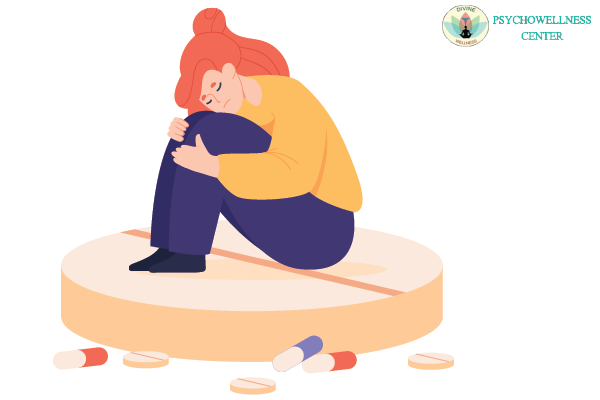Children suffering from generalized anxiety disorder have several, varied worries that are made worse by stress. These kids may be energetic and restless, and they frequently have trouble focusing. They may have trouble sleeping, perspire a lot, feel worn out, and complain of bodily discomfort (eg, stomachache, muscle aches, headache). The abrupt and severe change in routines brought on by the COVID-19 outbreak, including school closures and exile from extended family, friends, teachers, and cultural and religious groups, made nearly all children more anxious. Stress was also heightened by spending weeks to months in cramped quarters with family members, parental job loss, and overall future uncertainty.
Diagnosis of GAD
Children and adolescents with prominent and incapacitating anxiety symptoms who do not fit the criteria for a particular disease like social anxiety disorder or panic disorder are diagnosed with generalized anxiety disorder. Children who have a specific anxiety condition, such as separation anxiety, as well as additional substantial anxiety symptoms that go beyond those of the specific anxiety disorder should also be diagnosed with generalized anxiety disorder.
Specific requirements include each of the following:
-
Excessive anxiety and concern that patient find challenging to regulate
-
For around six months, symptoms were present on the majority of days.
-
Significantly distressing symptoms can make it difficult to operate socially or academically.
The following requirements must also be supported by at least one of the following:
-
Unease or a feeling of tension or alertness
-
Being prone to fatigue
-
Difficulty paying attention
-
Irritability
-
Tense muscles
-
Sleep disruption
Because generalized anxiety disorder can make it difficult to pay attention and can produce psychomotor agitation, it occasionally causes confusion with attention-deficit/hyperactivity disorder (ADHD) (i.e., hyperactivity). Children with ADHD, however, also struggle to focus and feel restless even when they are not feeling nervous. Some kids struggle with both anxiety and ADHD. For specialized support with Generalized Anxiety Disorder in youth, consult a “Psychologist in Delhi”.
Q. What contributes to a toddler or teen’s generalized anxiety disorder?
According to experts, biological and environmental factors can both contribute to generalized anxiety disorder. Anxiety tendencies can run in a family. Most likely out of balance in the brain are the neurotransmitters serotonin and norepinephrine.
A youngster might learn about anxiety and dread through family members and other people. For instance, a youngster who has a father who is scared of thunderstorms can develop that fear as well. General anxiety might also result from a stressful occurrence. The passing of a parent, a divorce, or a catastrophic sickness or accident within the family might all fall under this category.
Relaxation therapy in treatment
Generalized anxiety disorder is particularly difficult to treat with behavioural therapy because the emphasis of symptoms is scattered. Sometimes anxiolytic medications, typically selective serotonin reuptake inhibitors (SSRIs). Training in relaxation is frequently more suited.
Anxiolytic medications may be required for patients with severe generalized anxiety disorder or those who do not respond to psychotherapy therapies.
SSRIs are frequently used to treat anxiety disorders, just as other anxiety disorders (see table Drugs for Long-Term Treatment of Anxiety and Related Disorders). Children who cannot tolerate SSRIs may occasionally be treated with buspirone, albeit it is much less successful. Buspirone is first used orally twice daily at a dose of 5 mg; as tolerated, the dose may be gradually increased to 30 mg twice daily (or 20 mg three times daily). The ability to increase dosage may be restricted by gastrointestinal discomfort or headache.
Which kids and teenagers are susceptible to developing generalised anxiety disorder?
The likelihood of anxiety in children whose parents suffer from an anxiety disorder is higher. Toddlers that appear more restrained may be more prone to worry.
What can you do to support your child or teen as they cope with their generalised anxiety disorder?
The care of a child is significantly influenced by the parent. These actions will assist:
-
Keep all of your appointments with the Therapists in delhi for your child. Make sure to take any prescribed medication exactly as it is instructed. Any side effects should be reported.
-
Give your child assurance. Your youngster may not recognise their worry is greater than what is necessary when they have general anxiety. You and other adults will need to reassure your child more often.
-
Pay attention to your kid. Learn about relationships, social media activities, and school. Bullying is a severe issue that impacts numerous kids, both in person and virtually.
-
Make it clear to your child that they can talk to you about anything, especially if they are feeling so nervous or depressed that they are contemplating self-harm.
-
Enjoyable, stress-free time should be spent with your child. Take a stroll, eat dinner, or see a movie.
-
Discuss the additional medical professionals who will be involved in your child’s care with the person who will be caring for your child. A team of professionals, including teachers, social workers, the Best psychologist in India, Best psychiatrist near me, and psychiatrists, may provide care for your kid. Depending on their needs and how severe their anxiety is, your child’s care team will change.
-
Inform people about your kid’s anxiety. Consult your child’s school, doctor, and other pertinent parties to create a treatment plan. Tell the teachers that your youngster will require more consolation.
-
Request assistance from the neighborhood community services. It may be beneficial to communicate with other parents who have kids who suffer from generalized anxiety disorder.
Additionally, you may schedule an appointment with the top Psychologist in delhi and receive Mental health counseling at the Psychowellness Centre, which has many locations in Delhi NCR, NOIDA, Faridabad, Janakpuri, Dwarka, and Vasant Vihar.
Contribution: Dr (Prof) R K Suri, Clinical Psychologist, life coach & mentor TalktoAngel & Ms.Varshini Nayyar, Psychologist.

